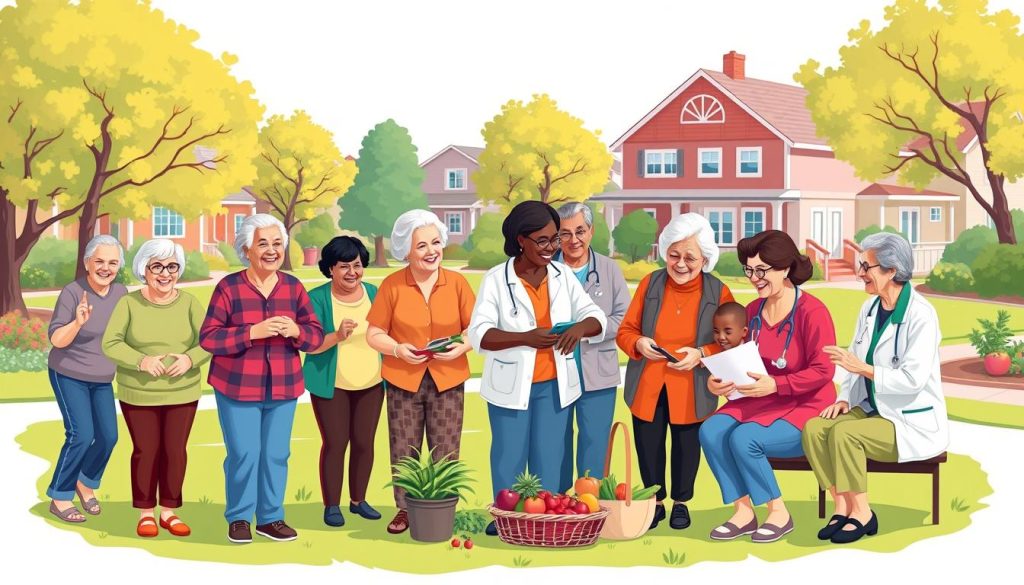How can we help seniors with many health problems live better? Nearly 80 percent of older folks in the U.S. have at least one long-term illness. Over half have more than one. Managing these illnesses well is very important. Seven out of every ten deaths1 are linked to chronic diseases. It’s key to know how to handle this. We need good healthcare teams, technology, and support for seniors. These help improve their health and life quality. Let’s look at how special programs and care for the elderly can make a big difference.
Key Takeaways
- Chronic diseases significantly impact the health and well-being of older adults.
- Over 80% of seniors live with at least one chronic illness, showcasing the urgent need for tailored health strategies.
- Effective management can lead to improved quality of life and reduce hospital visits.
- Coordinated healthcare approaches are vital in managing chronic conditions among the elderly.
- Technology plays a crucial role in enhancing chronic disease management for seniors.
Understanding Chronic Conditions in Seniors
Getting to know chronic conditions is key for helping older people. Chronic diseases last more than three months. They deeply affect daily life. Such conditions can make people less able to do things. They also need more healthcare. This is why taking care of older people with these diseases is very important.
Defining Chronic Diseases and Their Impact
Many older adults, about 94.9%, have at least one chronic disease. Around 78.7% have two or more2. Diseases like arthritis, high blood pressure, diabetes, and heart problems lower life quality. They can lead to more health issues. For instance, obesity is common in 40% of older adults. It is connected to many chronic diseases3. This shows we need good ways to manage these diseases to help seniors feel better.
Prevalence of Chronic Conditions Among Older Adults
Many seniors, over 85%, report at least one chronic disease. About 65-75% deal with multiple illnesses4. More and more elderly people are getting chronic diseases. This means we need health care that focuses on what older adults need. Without the right help, many face great health risks. This could mean going to the hospital a lot or not enjoying life as much.
Importance of Chronic Disease Management for Seniors
Managing chronic diseases is key to improving seniors’ lives. Almost every senior has at least one chronic illness. Good management helps keep them healthy and out of the hospital4. It helps seniors stay independent and active in their communities.
Enhancing Quality of Life
Better management of chronic illnesses boosts seniors’ well-being. Programs like the CDSMP make a big difference in their lives5. These programs teach seniors to live healthier and communicate better with their doctors.
Reducing Hospitalizations and Emergency Care
Managing chronic diseases saves money too. These diseases cause most of the healthcare costs because they often need hospital care4. Self-management programs can reduce ER visits. This saves about $714 per person5. This shows how important ongoing care and support for seniors are. It saves stress and money for everyone involved.

Challenges in Managing Chronic Conditions
Seniors face big hurdles in managing long-term health issues. They often struggle to use the healthcare system well. This is hard because they may not move easily or think as clearly. It makes getting the right care tough.
Navigating the Healthcare System
For seniors, the healthcare system can be confusing. It’s hard to know which doctors to see or medicines to take. Over 90% of the US’s healthcare money goes to chronic illnesses6. Good healthcare guidance could lower costs and help seniors feel better.
Communicating with Healthcare Providers
Talking clearly with doctors is key to handling illnesses well. But, many seniors find it hard to share their health worries. This can mix up their care plans. If seniors work together with their doctors, they’re more likely to stick to treatments. Educated patients often see better health results6. This shows how important it is to speak up and ask questions.
Social Isolation and Its Effects
Being alone a lot is a big problem for seniors. It makes their health worse and can lead to early death. If they’re lonely, they might not eat right or get help when needed. Being lonely can make seniors skip their treatments or pick up bad habits. Helping them find support is crucial6.
Strategies for Effective Chronic Disease Management for Seniors
Managing chronic disease in seniors needs a strong healthcare team. This team includes doctors, family, and helpers. Together, they make a plan that fits the senior’s health needs.
Building a Supportive Healthcare Team
Having a supportive healthcare team for seniors is key. It includes different experts like doctors and nutritionists. They all work together to make care plans that suit each senior’s needs. Taking a friend or family member to doctor visits is also helpful7.
Coordinating Care Services
Coordinated care services are vital for seniors with chronic diseases. They ensure that all treatments work well together. For example, teaching seniors to manage their health leads to better life quality89. Regular health checks help catch problems early, leading to healthier living.

| Health Strategy | Description | Benefits |
|---|---|---|
| Regular Consultations | Frequent check-ups with healthcare providers. | Ensures proactive health management and timely adjustments to care plans. |
| Personalized Care Plans | Customized health plans that reflect individual needs. | Enhances compliance and effectiveness of treatments. |
| Community Resources | Support from local organizations and groups. | Provides emotional and practical assistance. |
| Pharmacist Involvement | Engaging pharmacists for medication management. | Reduces risks of interactions and side effects, improving medication adherence7. |
Role of Senior Health Monitoring Tools
For older people with chronic diseases, health monitoring tools are very important. They include tech that helps with daily health care. This becomes more crucial as more people get older.
Technology in Health Tracking
Almost all seniors live with a chronic sickness. Thus, tech for health tracking is vital. It helps keep their health in check. Systems that monitor patients from afar will grow. They show how tech can change the care for chronic diseases.
By 2030, there will be 73 million people aged 65 or older in America10. This fact puts pressure on health care to use such tech well. Using many health tools helps stop diseases from getting worse. Often, these diseases could send someone to the hospital.
Wearable Devices and Apps
Senior wearables are popular for managing chronic diseases. Many studies support their use. Now, there are over 100,000 apps using data from these devices11.
Seniors in care programs see a 15% drop in hospital stays10. Wearables and apps together help seniors watch their health closely. They stay on top of their health journey as tech gets better.
Senior Wellness Programs and Their Benefits
Senior wellness programs help older adults stay healthy and happy. They include activities like exercising, eating well, and making friends. These programs are great because they help seniors feel better physically and mentally. Being part of a community wellness program also helps seniors do better in life.
Community-Based Wellness Initiatives
Programs in communities give strong support to older people. They promote living a healthy life. Being part of programs like SilverSneakers makes seniors feel less lonely and happier12. A study found that older adults enjoy programs that include making friends13.
Exercise and Nutrition for Chronic Disease Prevention
Staying active and eating right are key to avoid chronic diseases. Sadly, not many older Americans are as active as they should be13. But senior wellness programs that provide special exercises can help more seniors get moving. One partner of HealthPRO Heritage saw a 32 percent better balance in seniors. This reduced their chances of falling12.
Also, not enough seniors eat the right amount of fruits and veggies13. Health and wellness checks in these programs can make seniors follow better diets. This leads to living longer and being healthier.
| Program Type | Benefits | Statistics |
|---|---|---|
| SilverSneakers | Improved mental health; reduced loneliness | Participants showed better outcomes than non-participants12 |
| HealthPRO Heritage | Fall risk reduction | 32% improvement in balance12 |
| General Nutrition | Increased fruit and vegetable intake | 12.4% and 10.9% met guidelines respectively13 |
Importance of Medication Management
Managing medicines for older people is very important. It helps keep them healthy, especially if they have many sicknesses. Because they often take many medicines, they need to manage them well. This prevents mistakes and makes their lives better. Pharmacists are key in helping with this, making sure medicines are taken right.
Working with Healthcare Providers and Pharmacists
Older adults, doctors, and pharmacists working together is key. This teamwork helps manage many medicines well. Pharmacists help with medicine therapy management (MTM). This has been shown to help people with chronic diseases like diabetes and high blood pressure14. Talking well with doctors and pharmacists helps avoid hospitals and other problems15.
Annual Medication Reviews
Having a yearly check of medicines is very important. It helps doctors see if medicines are working well together. It also helps change medicines if health changes. This is very helpful for seniors who were just in the hospital. They need good support to manage their medicines well15. Services at home can help older adults take their medicines right15.
| Key Aspects of Medication Management | Benefits |
|---|---|
| Collaboration with Pharmacists | Improves medication adherence and resolves medication-related problems14. |
| Annual Medication Reviews | Identifies potential medication interactions and enhances safety15. |
| In-home Assistance | Supports seniors in adhering to medication regimens, reducing complications15. |
| Monitoring Side Effects | Ensures timely adjustments in medications, leading to improved health outcomes16. |
Starting a good medicine management program is key for doctors. It helps them watch how well the medicines work. This leads to fewer health issues. It also makes life better overall.
Geriatric Care Solutions and Support Services
Finding the best care for older folks with long-term sickness is key. These solutions make sure help is just right for them. It keeps them living well while handling health problems. Services at home for sickness are crucial. They help keep independence and happiness.
Long-Term Illness Support for Seniors
Most seniors have at least one long-lasting illness, showing a big need for help17. Skilled nurses and physical therapy let them manage sickness at home. Tailored care for older folks is very important.
Home and Community-Based Services
Home care lets seniors get help without moving to a facility. Help with personal care and cleaning matters a lot18. It lets them have a good daily life while getting care for their illness.
Coordination of Care Services
Handling illness in older adults needs well-coordinated care. Talking clearly with doctors and having a good care team helps a lot17. Programs like New York’s Medicaid Personal Care fit the help to what each person needs. This makes sure seniors get the support just right for them18.
Conclusion
Managing chronic diseases for seniors is hard but very important. It needs both medical help and friends’ support. About 117 million people in the U.S. have at least one chronic condition. This makes it key to manage these diseases well19. Using tech like health trackers and online doctor visits can make a big difference. They help seniors follow their health plans better and save money19.
Also, the cost of managing chronic diseases is high because of medicines and doctor visits. New payment models are helping with better care19. So, it’s important for seniors and those who look after them to learn about help available. This way, they can better find their way around health care. It helps avoid missing out on care which can make health worse. Learn more at chronic disease management overview.
Ending on a hopeful note, if we focus on early care and working together, seniors’ lives can get better. By looking at these key strategies, seniors can stay more independent. This also means their diseases won’t affect their daily lives as much20.
Source Links
- Managing Chronic Conditions for Elderly Adults: The VNS CHOICE Model
- Top 10 Chronic Conditions Affecting Older Adults
- Reducing Chronic Disease and Disability
- How Do We Overcome the Burden of Chronic Disease for Older Adults? | The Pursuit | University of Michigan School of Public Health | Aging | Cancer | Chronic Disease | Health Care Management
- Understanding the Challenges and Cost of Chronic Diseases
- 7 Challenges in Delivering High-Quality Care to Patients with Chronic Conditions – ChartSpan
- How older adults can manage chronic conditions
- Living with a Chronic Condition
- How to Manage Chronic Conditions in the Elderly – Senior Health Care Solutions
- Chronic Care Management Program for Seniors
- Remote Monitoring Systems for Patients With Chronic Diseases in Primary Health Care: Systematic Review
- Senior Wellness – Breaking Down the Benefits
- Aging Adults’ Preferences for Wellness Program Activities and Delivery Characteristics: A Cross-Sectional Survey
- Medication Management Models for Chronic Disease Management – RHIhub Toolkit
- The Importance of Medication Management for Seniors
- Why is Medication Management Important for Seniors? – Managed Health Solution
- How to Manage Chronic Conditions in the Elderly Properly
- Elder Care Solutions at Home
- Chronic Disease Management Strategies For Seniors
- Chronic Disease Management: Improving Outcomes, Reducing Costs

Leave a Reply